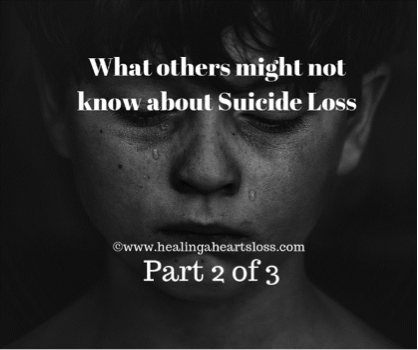Below is a continuation of a prior post on some of what others might not know about SUICIDE LOSS and the experiences that someone has when a suicide death happens to a person they care about. Not only care about, but perhaps they have found the deceased person who died by suicide.
- Consider some of the other factors an individual may have to deal with after a suicide death loss and sometimes before;
- They may worry their person may be suicidal and can’t find them
- They may worry their person is suicidal and have tried everything to try to prevent this from happening; such as medication and hospitalizations (people do die in the hospital or convince the medical staff to let them out and then they succeed at suicide.DO NOT BE LULLED INTO A SENSE OF COMPLACENCY THINKING THE MEDICAL PROFESSION HAS ALL OF THE ANSWERS)
- They may have financial worries that are enhanced now due to funeral cost, needing time off work, unable to return to work, reduced income if on short term disability with the potential leading into long term disability.
- They may have EXTREME WORRY ABOUT SOMEONE ELSE DYING BY SUICIDE… which is warranted.After someone close to you dies by suicide you are now higher on the list for suicidal thoughts yourself.Now picture trying to handle one suicide death and worrying about another family member becoming suicidal…all while still trying to function in your life and “get over it”!!!How do you think the grieving person is doing now? They never “get over it”!!!
- They may worry and be unable to do anything about it, because they cannot get out of bed, take care of their family, go to work, cook meals etc. this happens often. Their brain is foggy and forgetful, if they remembered something in the first place.
- They may worry so much about wanting the pain of this loss to end that they consider suicide themselves, but don’t want others to know this. THIS IS SERIOUS! It is because they cannot conceive of going on without their special person in their life.
- Depending on if this is the loss of a spouse, parent, child etc., specific other compounding concerns may be present.
The main point here is; if this is not a part of your lived experience you have no idea how someone feels or how hard they are trying to get and feel better.
In the next post there will be ideas and suggestions as to how you can help someone who has experienced a suicide death loss.
Stay tuned for the continuation with part 3 of 3 in the next article.
All my best,
Barbara Gillett Saunders
Share a smile with someone else today.

